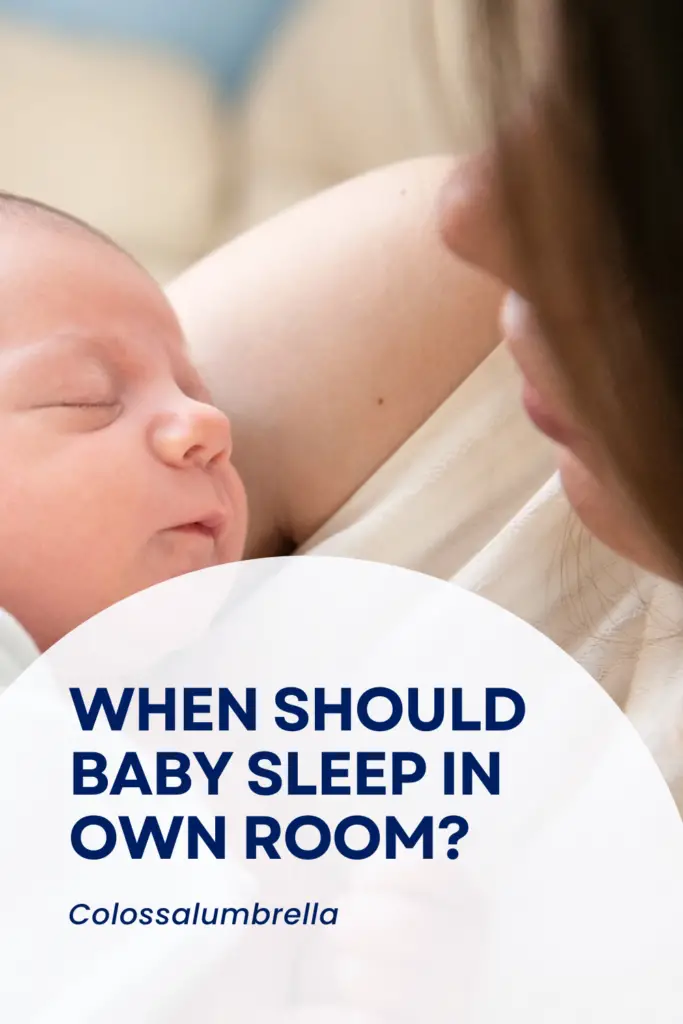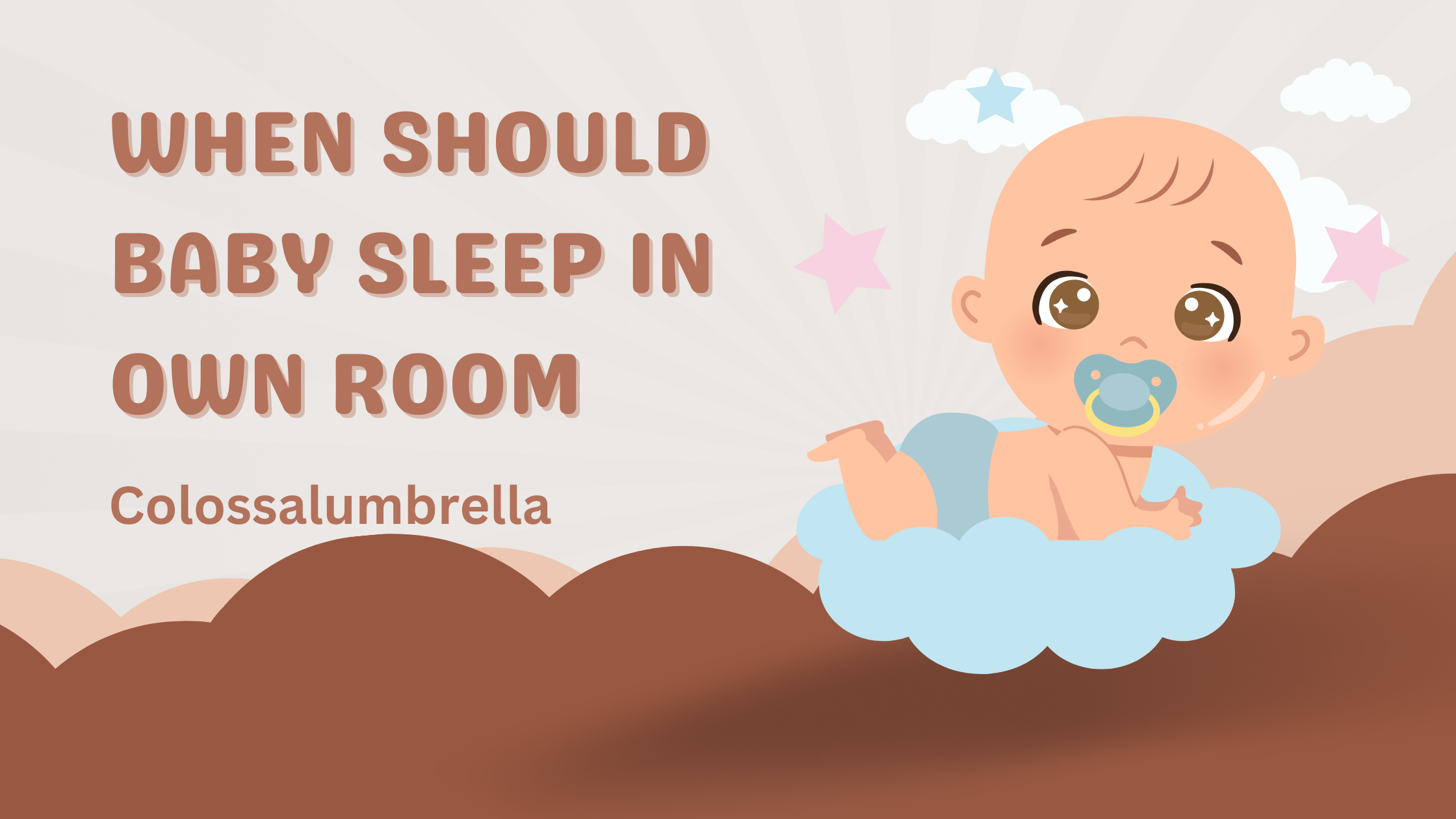Contents
Are you tired of being woken up by your little one every few hours? Are you ready to reclaim your bed and say goodbye to those 3am kicks to the face? Then it’s time to start thinking about when should baby sleep in own room
But hold on, before you start cartwheeling with excitement, it’s important to make sure you’re doing this at the right time. After all, little babies are fragile and delicate, and we want to make sure they’re safe and sound before we send them off to dreamland on their own.
In this blog post, I’ll be guiding you through the process of figuring out when your baby is ready to make the move to their own room, and sharing some tips and tricks to make the transition as smooth as possible. And because let’s be real, being a parent can feel a bit like being a superhero, I might even throw in some Marvel references along the way.
When is it safe to move your baby to their own room?
The American Academy of Pediatrics (AAP) recommends waiting for at least six months to one year before moving your baby to their room. This reduces the risk of sudden infant death syndrome (SIDS) and allows you to monitor your baby’s breathing and behavior.
After completing 6 months, you can plan to moving your newborn to their own room but keep consider their overall health including weight.
Of course, safety is key. Before you make the move, make sure the room is a comfortable and safe for you little one. And if you feel extra paranoid like me, a baby monitor is a great investment.
It is all about finding what works best for your family. Just like how Iron Man and Captain America have their own unique skills, your baby is an individual with their own unique sleep needs.
Signs when should baby sleep in own room
It’s always a tough decision to move your little one to their own room, but sometimes it’s just necessary for everyone’s sake. So, how can you tell if your baby is ready for the big move? Here are some signs to watch out for:
- Longer sleep stretches: If your baby is starting to sleep for longer stretches at night (around 6-8 hours), it may be a sign that they are ready to sleep in their own room. This is kind of like when Bugs Bunny finally outsmarts Elmer Fudd.
- Increased independence: Is your baby starting to show signs of independence, like wanting to explore their surroundings or self-soothe? These are good indicators that your baby is ready to sleep in their own room, much like how SpongeBob SquarePants gains more independence from his boss, Mr. Krabs, as he becomes more confident in his own abilities.
- Less frequent feeding: If your newborn is no longer waking up frequently to nurse or feed, it is a sign that your baby is ready for his own space.
Tips for transitioning baby to their own room
Transitioning baby to their own room can be a big challenge, but it can be a lot more manageable. So, here are some tips to help you transition your baby to their own room with a smile on your face:
- Gradual transition: Start by spending some time in your baby’s new room during the day, like setting up a picnic with the Avengers. Get comfortable and have some fun with your little one, so they can start getting used to the new environment.
- Familiar objects: Adding some of your baby’s favorite toys or a poster of their favorite superhero can make the room feel more like their own. You can even make a fun game out of finding the perfect decorations together.
- White noise: Consider using a white noise machine, or playing soothing music that your baby likes. Imagine your baby is Tony Stark and needs his own Iron Man suit to sleep soundly at night.
- Stick to a routine: Have a consistent bedtime routine that includes some fun, like singing your baby’s favorite superhero theme song. This can make the transition feel less daunting and more like a fun adventure.
- Don’t rush it: Remember that every baby is different, and they may take some time to adjust to their new room. Embrace the process and don’t be too hard on yourself or your baby. Remember, just like how Captain America takes his time to train and prepare for battle, take your time with the transition and enjoy the journey.

Common challenges parents may face during the transition
Transitioning baby to their own room can come with some challenges. As with any big change, it’s normal to encounter some bumps in the road. Here are some common challenges that parents may face during the transition:
- Separation anxiety: Your baby may feel a sense of separation anxiety when they realize they’re no longer sleeping in the same room as you. This is normal, and it can take some time for your baby to feel comfortable sleeping alone.
- Sleep disruptions: Your baby may experience more frequent awakenings or difficulty falling asleep in their new room. This can be due to the new environment, the different noises, or simply because they miss being close to you.
- Safety concerns: As you’re transitioning your baby to their own room, you’ll want to make sure that the room is safe for them to sleep in. This means checking that the crib is properly assembled, that there are no loose or hanging cords, and that the room temperature is appropriate for your baby.
- Regression: Your baby may start to show signs of sleep regression during the transition. This can mean waking up more frequently at night, resisting bedtime, or waking up earlier in the morning.
- Parental anxiety: It’s natural for parents to worry about their baby’s well-being, especially during a big transition like this. Just like how Spiderman sometimes doubts himself, parents can feel uncertain about how to handle the transition.
Benefits of having your baby sleep in their own room
While moving your newborn to their own room is a challenging task, there are many benefits to having your baby sleep in their own space.
- Better sleep: Now who can deny better sleep. Both you and your baby will sleep better. You won’t be disturbed by your baby’s movements or sounds, and your baby won’t be disturbed by your movements or sounds.
- Independence: Sleeping in their own room can help your baby become more independent, which can benefit them in the long run.
- Safer sleep: When your baby sleeps in their own room, they’re less likely to be exposed to environmental factors that could be dangerous for their sleep, such as snoring, loud talking, or bright lights.
- Relationship bonding: Having your baby sleep in their own room can actually help you bond with them. You can have more quality time with your baby during the day, and they may be more excited to see you in the morning.
- Personal space: Sleeping in their own room can help your little one feel more comfortable in their own space.
Conclusion
As I wrap up, I recommend that you think and plan before you decide to transition your baby into their own room. Remember to take time, trust yourself, and don’t be afraid to ask for help. And if all fails, just channel your inner Hulk and smash through those challenges!
Transitioning baby to their own room is a big step, but it’s one that can benefit both you and your little one in the long run. From better sleep to increased independence, there are many reasons why it’s worth the effort.
So go ahead and take the leap! With these tips, tricks, and superhero references, you and your baby will be sleeping soundly in no time.
I would stay connected and keep you updated with parenting tips, pregnancy guides, creative ideas, easy crafts, and Free Printables. Subscribe to Colossalumbrella to get new ideas delivered to your inbox. Follow me on Facebook, Pinterest, Twitter, and Instagram.
Disclaimer: The content of this blog is for informational purposes only and is not intended to be a substitute for professional medical advice, diagnosis, or treatment. Always seek the advice of your physician or other qualified healthcare providers with any questions you may have regarding a medical condition.

One thought on “When should baby sleep in own room -5 Tips to help your newborn”
Comments are closed.